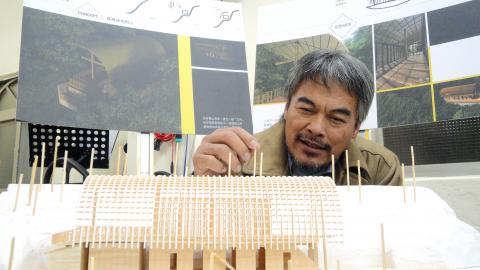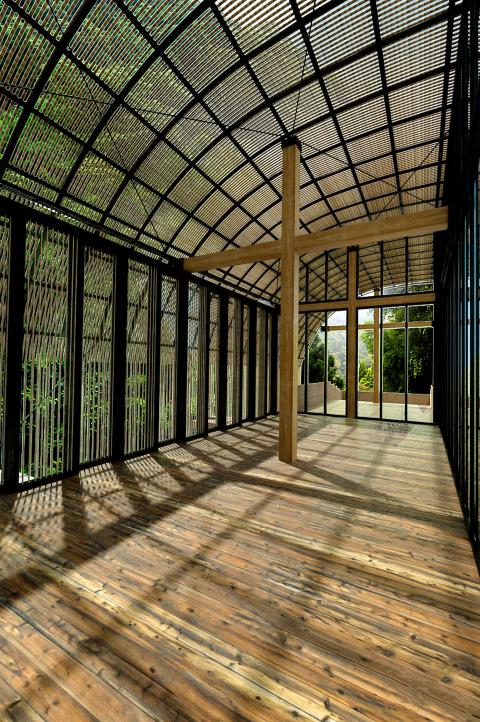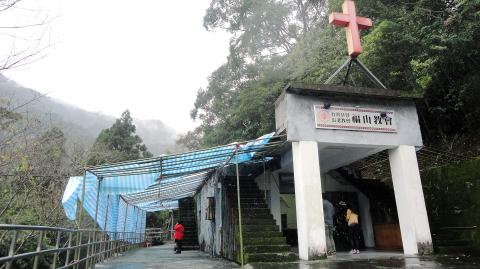Even before preacher Lin Ching-tai (林慶台) took over the ministry of Fushan Church (福山教會) in New Taipei City’s Wulai District (烏來), he knew that he faced an uphill struggle — a decreasing number of villagers and a church with huge holes in its roof.
“The state of the church shocked me,” Lin told the Taipei Times while standing in front of the two-story structure and pointing to a large piece of tarpaulin that covers the roof’s most serious leak.
“It’s too small and was leaking everywhere,” Lin, who had a role in the movie Seediq Bale (賽德克.巴萊), added.

Photo: Tang Hsiang-yi, Taipei Times
The idea to repair the church then emerged. But Lin wanted to do more than just fix the roof. The preacher said that by restoring and expanding the church, he hopes to create a positive educational space for Atayal children, who have to study elsewhere after elementary school because there isn’t a junior high school in the village.
“They only come back for summer and winter breaks, until they finish high school or college … After six to ten years of separation, they’ve lost touch with their Atayal roots,” Lin said.
Lin said it is a problem that is compounded by the fact that many returning teenagers have dropped out of school and have developed bad habits such as smoking, drinking and drugs. A new lease on the church’s life, he hopes, would translate into a more positive environment for children who seemingly have little hope.

Photo courtesy of Wooyo
But Lin’s plan requires money, manpower and architectural expertise, none of which he had ready access to. So he turned to the Taiwan Fund for Children and Families’ (家扶基金會), which connected him to FlyingV, a company that specializes in crowd funding.
CROWD FUNDING
A relatively new way to raise money in Taiwan, crowd funding gathers donations from individuals who support endeavors initiated by other people, usually via the Internet. Recent start ups include Opusgogo, Zeczec (嘖嘖) and Limitestyle.

Photo: Tang Hsiang-yi, Taipei Times
FlyingV began operations in March of 2012 and has since become Taiwan’s most successful crowd funding platform by dollars raised, project numbers and membership. It brought in NT$8.6 million for 27 projects in its first year, and more than NT$41 million for 110 projects last year.
Lin Ta-han (林大涵), FlyingV’s product director, cites Attack on Flour (太白粉的進擊) as a successful example. A parody of the Color Run, in which runners are showered with colored powder, Attack on Flour showered runners with corn starch.
“If the power of crowd funding could make this event happen, perhaps it can also build a church, and perhaps a hospital or a school,” Lin Ta-han said.

Photo courtesy of Wooyo
According to its Web site, FlyingV charges an 8 percent administrative fee. If the project doesn’t reach its monetary target, no fees will be charged, and all donations are returned to supporters. All projects have a set period of time, and supporters can donate until the time is up, even after the project has reached its fiscal goal.
“As long as the project has a clear goal, a target audience and some attractive qualities, it is a good fit for crowd funding,” Lin Ta-han said.
THE ARK PROJECT

Photo courtesy of Wooyo
Launched online last October with a goal of raising NT$7.7 million by April 30, the project has already received NT$700,000 in donations as of Saturday.
Hom Liou (劉冠宏), founder of Wooyo (無有), an architecture firm, leads the restoration effort. He says he plans to double the church’s current space with an arch-shaped roof supported by wooden crosses, which will bring in natural ventilation and light to minimize electricity bills.
Liou said the idea for the arched roof is taken from an Atayal myth, which tells of a “rainbow bridge” that leads to the spirits of their ancestors.
Computer simulations of the church show a structure resembling an ark, hence the project’s name: The Ark Project (方舟計畫), an obvious reference to the Biblical story of Noah’s Ark.
“In the Bible, Noah built an ark to save lives. My church seeks to do the same,” Lin Ching-tai said.
For more information, visit the Ark Project’s main page at www.flyingv.cc/project/1612.

Taiwan has next to no political engagement in Myanmar, either with the ruling military junta nor the dozens of armed groups who’ve in the last five years taken over around two-thirds of the nation’s territory in a sprawling, patchwork civil war. But early last month, the leader of one relatively minor Burmese revolutionary faction, General Nerdah Bomya, who is also an alleged war criminal, made a low key visit to Taipei, where he met with a member of President William Lai’s (賴清德) staff, a retired Taiwanese military official and several academics. “I feel like Taiwan is a good example of

March 2 to March 8 Gunfire rang out along the shore of the frontline island of Lieyu (烈嶼) on a foggy afternoon on March 7, 1987. By the time it was over, about 20 unarmed Vietnamese refugees — men, women, elderly and children — were dead. They were hastily buried, followed by decades of silence. Months later, opposition politicians and journalists tried to uncover what had happened, but conflicting accounts only deepened the confusion. One version suggested that government troops had mistakenly killed their own operatives attempting to return home from Vietnam. The military maintained that the

Before the last section of the round-the-island railway was electrified, one old blue train still chugged back and forth between Pingtung County’s Fangliao (枋寮) and Taitung (台東) stations once a day. It was so slow, was so hot (it had no air conditioning) and covered such a short distance, that the low fare still failed to attract many riders. This relic of the past was finally retired when the South Link Line was fully electrified on Dec. 23, 2020. A wave of nostalgia surrounded the termination of the Ordinary Train service, as these train carriages had been in use for decades

Lori Sepich smoked for years and sometimes skipped taking her blood pressure medicine. But she never thought she’d have a heart attack. The possibility “just wasn’t registering with me,” said the 64-year-old from Memphis, Tennessee, who suffered two of them 13 years apart. She’s far from alone. More than 60 million women in the US live with cardiovascular disease, which includes heart disease as well as stroke, heart failure and atrial fibrillation. And despite the myth that heart attacks mostly strike men, women are vulnerable too. Overall in the US, 1 in 5 women dies of cardiovascular disease each year, 37,000 of them